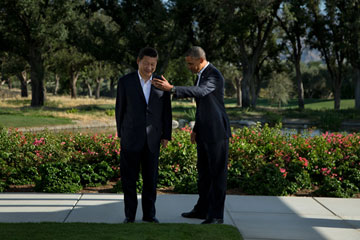
President Barack Obama, right, welcomes Chinese President Xi Jinping at the Annenberg Retreat at Sunnylands, Friday, June 7, 2013, in Rancho Mirage, Calif.
He was supposed to be on the island paradise of Bali, rubbing elbows with Asian heads of state and showing China that America is serious about being a Pacific power. Instead, on Oct. 8, Barack Obama was in the White House's cramped briefing room, embarrassed and apologetic. Managing the shutdown of the U.S. government had forced Obama to scratch his long-planned trip to a pair of Asian summits that he'd been touting as critical venues for a display of renewed American leadership in the region. Now he was telling reporters at a White House press conference that his grounding was a setback for the country. "It creates a sense of concern on the part of other leaders," Obama said. "It's almost like me not showing up for my own party."
Indeed, Obama's no show fueled doubts about whether America has the will and the resources to meet the challenge of a rising and potentially aggressive China. Obama officials have even given the policy for doing so a name the "rebalance" to Asia, or as insiders call it, the Asia "pivot," conveying a crisp turn of direction for U.S. foreign policy.
Pivoting has been easier to say than do, however.

